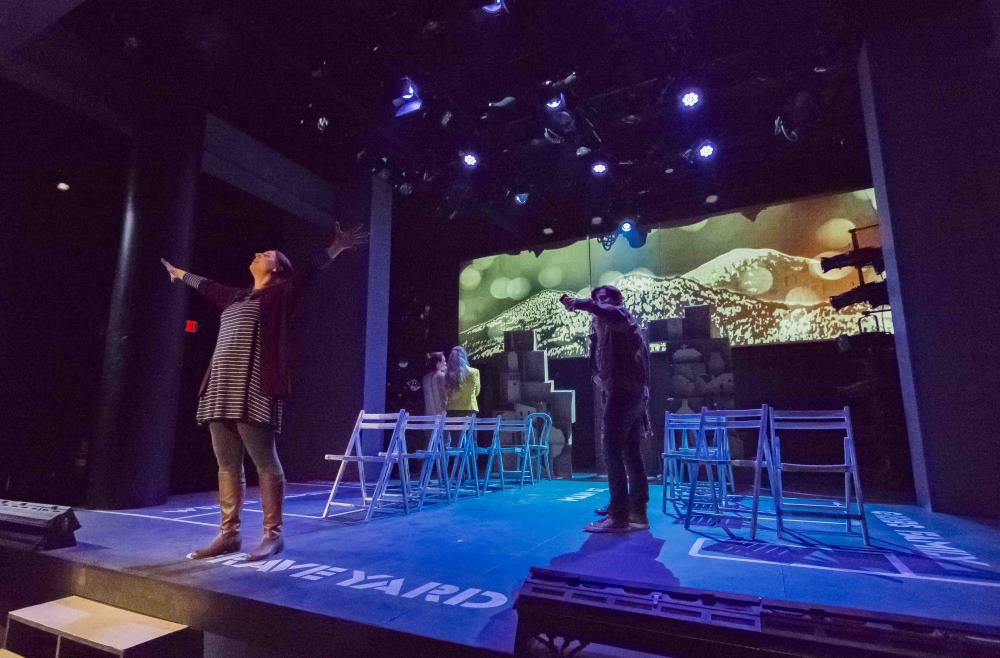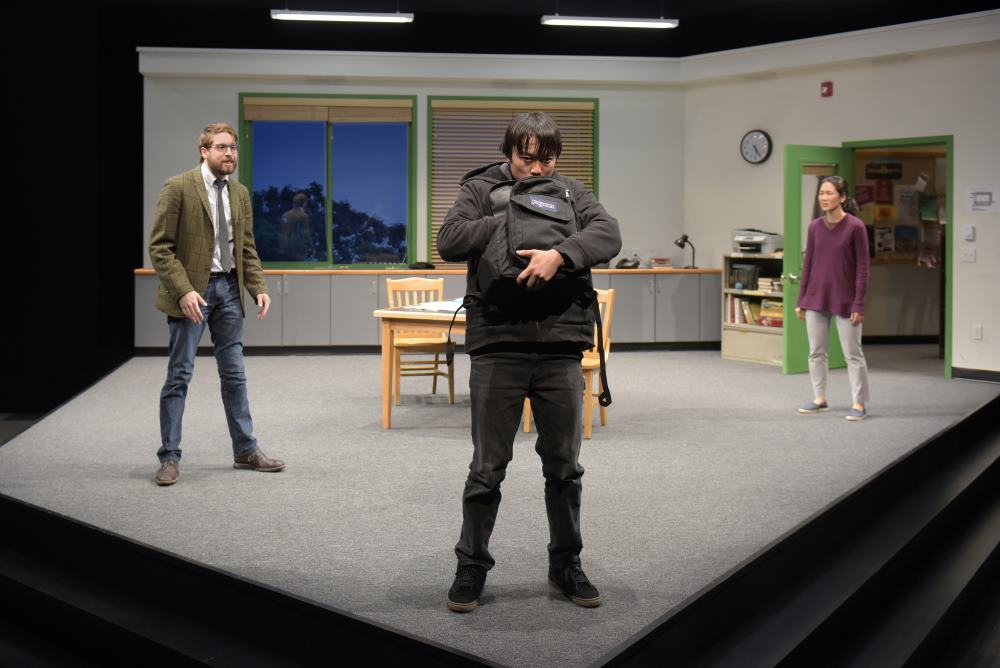I live on the East Coast, in a large city. I’m a registered Democrat who voted for Hillary Clinton. I make my living as a theatre artist and educator. I have never owned, nor even fired, a gun.
That doesn’t mean I’m not concerned about our country’s gun violence epidemic. Unfortunately our national discourse has, for years, framed the issue of gun control into rigid binaries: the rural, gun-owning, truck-driving American who wants to defend his constitutional right to possess and use firearms versus the city-dwelling, bike-riding, coastal elitist who wants to take all the guns away.
That these stereotypes lack any nuanced understanding of a complex issue seems almost beside the point; they’re effective, so much so that framing them this way has prevented us from productive attempts to curtail the problem. Our gun violence problem is, in part, a toxic masculinity problem, a domestic violence problem, and a suicide awareness problem. It is also a gun control problem, the issue at the heart of the hyper-partisan framing that falsely pits responsible gun owners against those merely seeking reasonable regulations.
Against this distinctly American backdrop, where attempts to curb the death toll are so often met with blunt-force opposition, where can we find space for the necessary complexity surrounding the issue? Enter playwrights. Like millions of Americans, they are angry, and they reject many of the ways we have traditionally framed the debate.
“I’m not interested in writing a play about gun control,” says Jennifer Barclay, whose Ripe Frenzy is being produced around the country this season as part of a National New Play Network rolling world premiere. It will next play at Synchronicity Theatre in Atlanta (April 13-May 6), and Greenway Court Theatre in Los Angeles (May 17-June 17).
Barclay continues, “If I wrote a play about gun control, it would be a lecture instead of a question. I want to write political plays that are also flawed, personal stories. And in this play, I’m interrogating the way that media reinforces the notoriety of mass shooters, the way that we as a country take in this news and how that cycle can pave the way for the next shooter to come along.”
Barclay’s colleague Jared Mezzocchi knocked on her office door at the University of Maryland as footage from the on-camera murders of reporters Alison Parker and Adam Ward started to emerge on Twitter feeds. The gunman, who was wearing a GoPro at the time of the assault, forced a nation of viewers to literally examine the incident from the perspective of the shooter.
Mezzocchi, a video designer who became an integral part of Ripe Frenzy’s development, describes how that shared moment of abject horror eventually yielded a play that encompasses greater, messier, more complex themes. “The script gives compassion to the grey area, and that unlocks our ability to have conversations,” he explains. “When we talk about these tragedies, so often it’s this massive spectacle where we shame everyone who didn’t see it coming.” He hopes that the play encourages audience to “engage in a conversation with their children, their communities, in a way that isn’t just about blame.”

“It feels like the times are calling us to produce more politically slanted work, but really, I think the times are calling the writers,” explains Tim Sanford, artistic director of Playwrights Horizons. The Off-Broadway theatre is currently mounting the world premiere of Lindsay Ferrentino’s This Flat Earth (through April 29). In the play, two middle schoolers struggle to comprehend the aftermath of a shooting at their school, asking, “Why don’t the grown-ups just fix it?”
As rehearsals began for the show, there was the real school shooting at Marjorie Stoneman Douglas High School in Parkland, Fla., which killed 17 students. Because of the timing, “I was nervous about it seeming opportunistic, or like an issue play,” Sanford admits. It’s an apt question: In such a politicized climate, what is the best way to present work encompassing controversial topics without presenting them as “issue” plays?
For some, the question is moot: Theatre artists shouldn’t shy away from expressing an obvious political viewpoint. In recent years, artists have embraced protest as a necessary branch of the art-form. Every 28 Hours, an open-source project with lauded collaborators across the country, has collected 70 short plays about gun violence as it pertains to the Black Lives Matter movement, available on a Pay-What-You-Can model. Those plays are included under the larger umbrella of the Protest Plays Project, who offer their collection of 200-plus plays for free, encouraging direct action correlating with last week’s March for our Lives.
Lauren Gunderson, currently the most produced playwright in the country, has offered her play Natural Shocks free to any organization who wishes to use it, so long as they produce it on April 20, 2018, the day of the National School Walkout (theatres have until April 6 to submit a request for rights). Encouraging groups to donate proceeds to groups like Everytown for Gun Safety or Moms Demand Action, Gunderson amassed 40 readings across 21 states within the first week of the project’s announcement.
Of course, framing any of the above-mentioned work as pieces of activism first and pieces of theatre second seems inherently marginalizing. All of these plays can be nuanced, heartfelt, surprising, exploratory, or transcendent, and they can do so while simultaneously expressing an overt political viewpoint. In other words, setting up the distinction between an “issue play” and a play that encompasses a controversial issue is perhaps as false a narrative as the one we are chronically fed regarding rural gun owners versus urban elites.

“This play isn’t an anti-gun play,” says Lisa Peterson, director of Julia Cho’s Office Hour, currently running at Berkeley Rep in California (through March 25). “This play is about a deeply troubled individual whose access to a gun makes him even more dangerous.”
Inspired by the real-life events surrounding the 2007 mass shooting at Virginia Tech, Office Hour examines the various permutations of “what if” that could have prevented violence and tragedy in the classroom. Peterson is upfront about her own anger at the National Rifle Association, and her frustration at the ease with which mass shooters have procured semi-automatic weapons. At the same time, she is adamant that Office Hour not be viewed through a purely political lens, but rather as a piece of theatre that examines complex, human characters, without offering any easy solutions.
Still, Peterson acknowledges, there are inherent challenges in presenting this work to an audience that already understands the magnitude of the gun violence problem well. This production, which she first directed at Long Wharf Theatre in January before transferring it to Berkeley, was performed about 25 miles from Sandy Hook, a community which hardly needed a message of “wake up and pay attention.” And Berkeley is arguably one of the most famously liberal communities in America; Peterson worries that critical response might include an eye-rolling sense of “We get it, we know this is a problem.”
“Yes, we live in a bubble,” admits Anthony Jackson, program manager for the Berkeley Rep School of Theatre. “But inside that bubble is the privilege to share opinions, to challenge one another.” Jackson recalls attending a talkback of Office Hour, where the room was half adults and half teenagers. “A lot of the adults were unaware of just how knowledgeable, involved, and invested these teens are. How this isn’t theory for them: They are genuinely worried about going to school, where people their own age are dying in their classrooms.”
Amid the televised marches and speeches in recent days, it feels increasingly relevant to return the focus to the Parkland activists. Much has been written about their status as drama club students, and for good reason: Not only is their perseverance deeply inspiring, it’s hard evidence that students in the throes of tech week know a thing or two about hard work, dedication, and triumph over impossible odds. Their efforts have also reminded us of what good theatre can do best: place a human story at the heart of a complex topic. Like the teens in Berkeley, this isn’t theory for them. They’ve watched their classmates die. And it’s long overdue for us to find new mechanisms to explore and solve this crisis.
Is it hopelessly naïve to suggest that playwrights shading murky complexity into works of art about gun violence can change the way we debate this issue on a national level? Of course.
But then again, if I told you three months ago that a high school cast of Fiddler on the Roof is now leading an angry nation in widespread public protest, I would have thought I was nuts, too. While the Parkland gunman might have been part of a tragic cycle of mass shootings, perhaps the Parkland teenagers are the products of a cycle of empathy: a passion for the best kind of theatre, where nuanced, human storytelling can propel us towards finding connections with others in the world we share together.
Among the many images from last week’s March for Our Lives that you’ve seen, there’s one that you likely haven’t: the members of the Marjorie Stoneman Douglas High School Drama Club, eating pizza on the stage of the Woolly Mammoth theatre in Washington, D.C., and receiving a backstage tour. Here those students aren’t Twitter icons or Time magazine cover stories. They’re just kids who love theatre, eating pizza, and hanging out with their friends. May all our country’s theatres open their doors in the same way: not just to these students, but to the movement they represent.
The Marjorie Stoneman Douglas High School drama department came a LONG way from Parkland to DC to #MarchForOurLives — so we thought the least we could do was open our doors for them! Dinner on stage, a Woolly tradition, just took on a whole new meaning. pic.twitter.com/72zPwpAWXG
— Woolly Mammoth (@woollymammothtc) March 24, 2018
Katherine Fritz is a Philadelphia-based educator, theatre artist, and writer whose words have been published in The Washington Post, MTV, and her blogs I Am Begging My Mother Not to Read This Blog and Ladypockets. You can follow her on Twitter at @katherinefritz1 or visit her website at katherinefritz.com.


